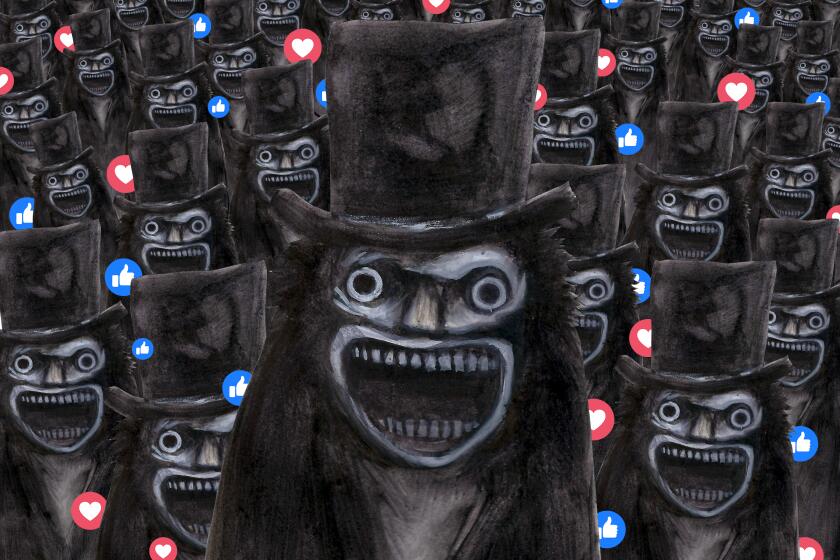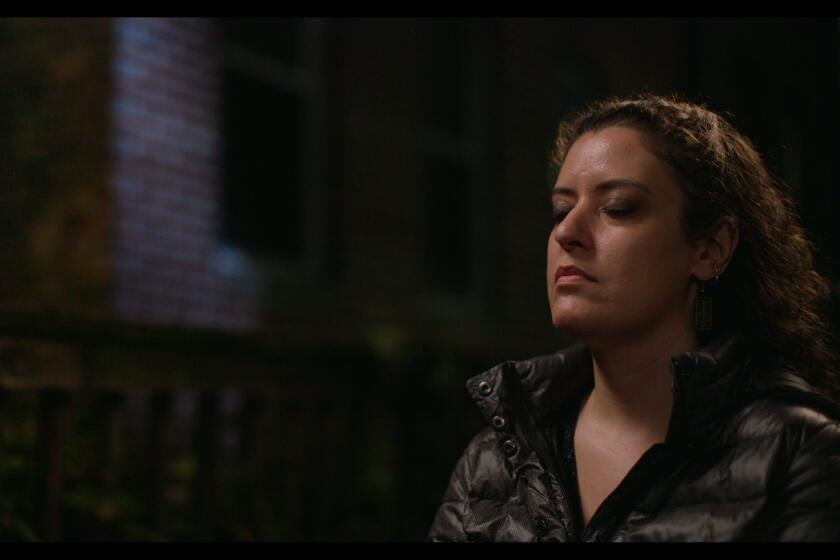Ghosts of Germany’s WWII past rise again in ‘Generation War’
When plans for a Holocaust memorial in Berlin were announced years ago, German writer Martin Walser wondered how many monuments to shame his country would have to build. It was a telling sentiment for a nation that could not cleanse the past yet wanted its young freed from the stain of their Nazi ancestors.
The ruin of World War II — bones of the fallen are still occasionally dug up in forests outside Berlin — led to decades of national silence, anger, reparation and collective guilt. But in recent years, German artists and filmmakers have sought more nuanced stories and characters, including a frail and bereft Adolf Hitler, who had been cemented in caricature for fear of historical sacrilege and accusations of revisionism.
The new film “Generation War” blends battlefields with ethical relativism. The movie, which opens Friday at Landmark’s Nuart Theatre, follows five friends who bid farewell in a bar as they listen to swing music and as war intensifies across the Eastern Front in 1941. “We were immortal,” says one of them. But those who return home four years later are shattered by the military folly and brutal conceits of their Führer.
PHOTOS: Behind the scenes of movies and TV
The friends are brothers Wilhelm and Friedhelm, both soldiers; Greta, a street-savvy singer; Charlotte, an idealistic nurse; and Viktor, the son of a Jewish tailor. Screenwriter Stefan Kolditz said the film was a “nonideological view on this generation, beyond the clichés of the good and the bad German... This war generation, sometimes called the ‘frozen generation,’ hadn’t talked about this time and their responsibilities for decades. We wanted them to speak.”
The 279-minute movie, whose battle scenes evoke the jerky monochromatic intensity of “Saving Private Ryan,” was both catharsis and hit when it aired as a TV miniseries last year. Sins are laid bare: Wilhelm executes an unarmed Russian POW, Charlotte betrays a Jewish doctor and Greta sleeps with an SS officer. Their humanity and patriotism are tested on a shifting plain of moral accountability, suggesting that a generation of Germans was cudgeled into complicity and was itself a victim of the Third Reich.
The newspaper Süddeutsche Zeitung said the film provided the chance “to ask our grandparents about their biographies, the immoral compromises…the missed chances to act.” The movie was directed by Philipp Kadelbach, who also directed “Hindenburg: The Last Flight,” a conspiracy tale behind the 1937 crash of a German zeppelin in New Jersey that starred Stacy Keach.
Some writers and European politicians criticized “Generation War” as an assuaging of history and a broadening of blame. Polish resistance fighters come off as murderous anti-Semites, a depiction that drew a formal protest from the Polish government and agitated that country’s past over its own questionable treatment of Jews. Others complained that the film did not accurately reflect the racism that seethed in Germany on the eve of war.
“The series tries to draw a distinction between Nazis and everyday Germans that simply did not exist in any broad way,” Laurence Zuckerman wrote this month in Tablet, an online Jewish magazine. “The tag line on the movie’s poster — ‘What happens when the country you love betrays everything you believe?’ — is demonstrably false. Most Germans believed in the Nazi agenda.”
Questions of guilt and responsibility have echoed for years. In his 1999 book, “On the Natural History of Destruction,” W.G. Sebald wrote that Germans in the years immediately after the war “regarded the great firestorms [during the Allied bombing of Dresden] as just punishment, even an act of retribution on the part of a higher power with whom there could be no dispute.”
That narrative had shifted by the 60th anniversary of Germany’s surrender in 2005. Films and books explored the complicated layers of the past, including the lives of low-ranking soldiers and women raped by Russian troops. The Academy Award-nominated “Downfall” portrayed Hitler, who had traditionally been a madman in the shadows, as more complex. The Führer’s hand — in a suggestion of Parkinson’s disease — shook as flawed and broken, he sought refuge in a bunker. The filmmakers argued that the humanizing portrait added a chilling dimension to his evil.
Holding the past up to a varied interpretations led to suggestions of revisionism. “Are the Germans now suddenly seeing themselves in a different light — as a community joined in suffering?” the magazine Der Spiegel asked in 2005, a year after “Downfall” was released. “Has the ‘nation of perpetrators’ become the ‘nation of victims’? Has the chapter of self-chastisement now been closed?”
“Generation War” and other films and books suggest that the chapter, if not closed, has been footnoted.
RELATED: The Monuments Men did more than rescue Nazi-looted art
Germany is Europe’s largest economy and its capital, Berlin, is one of the most liberal and artistically vibrant in the world. Intriguing questions, however, still linger over how deeply a nation’s past should reach into its present, whether it’s the Holocaust, genocide in Rwanda, the killing fields of the Khmer Rouge in Cambodia or the slavery that led to the American Civil War. “12 Years a Slave,” nominated for best picture at this year’s Academy Awards, is an indictment that offers no moral equivocations.
But how long do the ghosts persist after those who committed the crimes — or accepted them through silence or inaction — are gone?
Screenwriter Kolditz’s father, Gottfried, was a soldier on the Eastern Front who later became a successful director. Several of the film’s actors also have connections to the past through other performances, including Volker Bruch (Wilhelm) who appeared with Kate Winslet in “The Reader” about the love affair of an illiterate concentration camp guard.
Kolditz, who spent eight years on “Generation War,” said he wanted to understand how a war “beyond every human imagination was led by ordinary young men and women. They weren’t the faceless and blind Nazi clichés of ... Hollywood movies, ready to easily get killed by brave American soldiers. But — which is more realistic and much more shocking — they were young men and women who did the most cruel and horrible things, although they weren’t killing machines at the beginning.”
The movie drew “very emotional reactions” from audiences in France, Australia, Ireland, Sweden and other countries, said Kolditz, whose other screenplays include “Dresden,” a miniseries on the war-time fall of that city. “Every reaction, every debate ... helps [us] not to forget.” He added: “The movie is very clear in his political and moral statement. There is no cleansing. Collective guilt does not exist without personal guilt.”
(“Generation War” will run from Feb. 28 through March 6 at the Nuart Theatre in Los Angeles. It will be shown in two parts with a separate admission.)
More to Read
Only good movies
Get the Indie Focus newsletter, Mark Olsen's weekly guide to the world of cinema.
You may occasionally receive promotional content from the Los Angeles Times.









